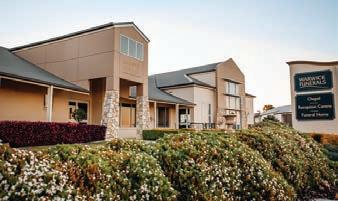
5 minute read
Worker shortage hits Southern Downs Council
Jonathan O’Neill oneill.jonathan1@outlook.com
Areport issued to the Ordinary Council Meeting of Southern Downs Regional Council on April 26 indicated that 21.3% of Council employees had exited the organisation, revealing a progressive increase at each reporting period.
Advertisement
Southern Downs Regional Council CEO, Dave Burges said that no trends are becoming evident to reveal the increased separation rates, but noted that the location of employee residences, lack of affordable housing in the Southern Downs and higher wages in the private sector are contributing.

“Of note lately, location seems to be a factor," he said. "Quite a number of our employees don’t live in the Southern Downs, they live in Toowoomba, Ipswich and various places and travel arrangements can become quite onerous, particularly if they’ve got young families.
“We’re just finding that people are prepared to move, but remuneration and other things would be a factor as well. I have noticed a trend lately where location seems to be important too."
The CEO told Councillors at Wednesday’s meeting that developing a strategy to address this is on his task list within the next six months, and also voiced that he thought the separation rate was starting to trend downwards.
“I thought that was starting to trend downwards, but that’s certainly not the case with the latest stats,” Mr Burges said.
“I did have access to the annual workforce survey undertaken by the LGAQ… the data I accessed a month ago was for the year to 30 June 2022, so it was a little bit out of date, but it did inform that for rural and remote councils, which we are one of, the separation rate is at 20% on average across the state.
“We are pretty much on that average… whilst it’s extremely challenging, it is endemic across the industry.
“SEQ are faring a lot better, they’re down to 10%, and they’re dragging the state average down, mainly because there’s such sheer numbers there.
“It is a problem state-wide. There’s a twenty percent turnover rate state-wide.”
Councillor Stephen Tancred spoke on the report, noting that his recent conversations with Councillors across the border in Tenterfield illustrate a similar scenario.
“There’s just so much going on in private enterprise. Even though it’s not a good trend, it’s nice to know that we’re not Robertson Crusoe,” Cr Tancred said.
CEO Dave Burges reiterated that the turnover rate for local Councils is expected to improve nationally over the coming years, the upcoming 2032 Olympics present SEQ with a massive challenge and a brain drain.
“The 2032 Olympics are providing no short term improvement in SEQ and we’re being impacted by that,” Mr Burges said.
“Consultants and contractors will continue poaching our staff over the next 10 years, which is not a good outcome.”
Our newspapers have heard unconfirmed reports from previous Southern Downs Regional Council employees that a "toxic culture" within Council was the reason for them resigning.
While these rumours have not been confirmed, if true, they do present a concerning reason for the tumbling staff attrition rates.
The reasons released by Council at the April 26 statutory meeting reflect the issues faced across the state by local Councils.
The decline in staff number is impacting on the workload of remaining employees, who are forced to take on the extra workload.
“If you have twenty percent of your staff turning over every year, that’s one fifth of 350, so it’s a lot of staff that aren’t in those seats,” Mr Burges said.
“You lose a lot of corporate knowledge and a lot of experience. There is a huge downside to it.
“It is a problem, and we just have to manage it as best we can.”
Enjoy a social get together and learn about a service often very misunderstood.
We will address the questions people often wonder, such as:
• Exactly what does the funeral provider do when a person passes away

• Do I need to have a funeral and how much control do I have of what it will look like?
• Where will my loved one be between when they pass and the day of the funeral?
• Do I need a coffin and what are the options with a coffin?
EVERYONE’S ENTITLED with Andrew Gale
Iwas According to a statement on research released by the Australian Road Safety Foundation last week, the friendly “thank you” wave between motorists is thought to be dying out. Apparently motorists are more and more reluctant to acknowledge other road users, even innocently, for fear that the wave may be mis-interpreted for more sinister hand signals. Thus, triggering roadrage responses.
Wow! How sad it is that we have come to that. However, are we really surprised?
The whole waving or not waving debate led me to wandering down a thought-path and reminded me of a few incidents in my life where waving had some strange outcomes.
Thankfully, out on the water, it is generally a lot more relaxed than travelling our roads. Having grown up and worked on and around the waterways of our east coast I’m used to waving at every boat that passes. It’s just what you do. In days of old ships would “dip’ insignia or utilise other forms of respectful signal to passing ships. Nowadays a radio call or a friendly wave is more in vogue.
I recall working in the Water Police in the 1990’s. Everyone waved to us, and vice versa. In fact it was that common that if someone didn’t wave it was so unusual it triggered alarm bells.
One time I was on patrol when we passed a small “tinny” with a couple of guys in it. I waved and they just stared at us goggled-eyed and didn’t wave back. “What’s up with them”? I thought. I quickly wheeled the boat around and chased up next to them but they immediately bolted. They headed for the shoreline, parking the boat in the mangroves and jumping overboard.
Unfortunately for them the tide was out, and they quickly became stuck in the mud. We then had to go into rescue mode.
The reason they bolted. Inside the boat were two massive garbage bin liners packed with freshly harvested cannabis plants. These guys were so happy though to be extricated from the mud that they actually took us back to where they had been growing it on a nearby island to show up their clever growing setup. Complete with water collection system and a little swimming pool to store water in.
I bet they wish to this day, “If only we’d waved back!”
Another time I remember working with a new guy at Water Police. He had just transferred there from an outer Brisbane suburb he had worked at for a number of years and it showed. I won’t say where he was from, let’s just say it was a suburb where plenty of battlers lived and battles with the police were pretty regular events.
Anyhow, this day we were partnered up and were patrolling the river and bay in one of our boats. People were waving and I was waving back as I do, but after a bit I noticed my deckhand wasn’t getting into it. In fact, he was getting angrier and angrier every time someone passed and waved.
When I asked him what was up, he truly couldn’t believe that people were being friendly. I suppose that happens when you come from a place where people only wave at you with the back of their hand. With a finger extended.
I think that’s called conditioning.






